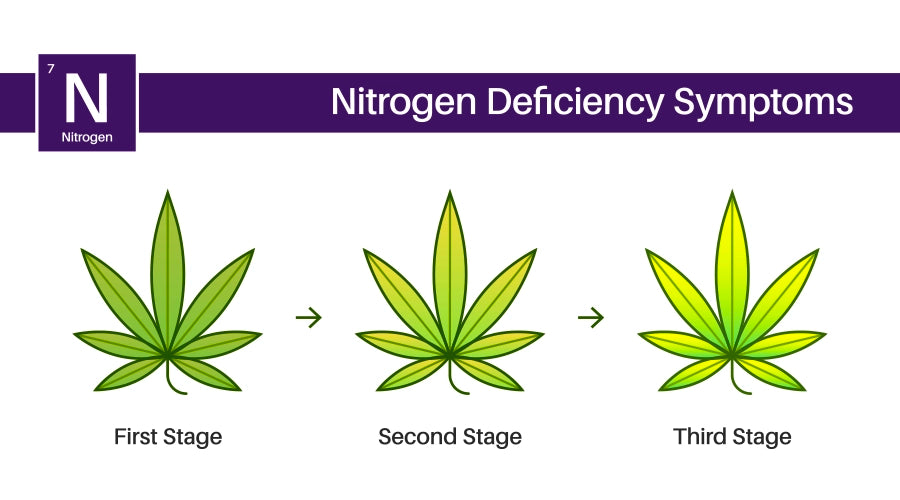
The Top 5 Nutrient Deficiencies in Cannabis Plants and How to Fix Them
Maximizing Cannabis Yield by Addressing Nutrient Deficiencies
Nitrogen Deficiency:
Nitrogen is a vital nutrient for plant growth, and its deficiency can cause the yellowing of leaves, stunted growth, and reduced yields. To fix this deficiency, you can add nitrogen-rich fertilizers to the soil or use organic alternatives like fish emulsion or blood meal.

Phosphorus Deficiency:
Phosphorus is another essential nutrient that aids in the growth of healthy roots, stems, and flowers. Signs of phosphorus deficiency include dark green leaves and stunted growth. To fix this, you can add phosphorus-rich fertilizers to the soil, such as bone meal or rock phosphate.

Potassium Deficiency:
Potassium helps plants to develop strong stems and healthy roots, and it also plays a crucial role in flower development. Symptoms of potassium deficiency include yellowing and curling of leaves. To fix this, you can add potassium-rich fertilizers like potassium sulfate or potassium chloride to the soil.

Calcium Deficiency:
Calcium is important for cell growth and the development of strong cell walls. Signs of calcium deficiency include stunted growth, curled leaves, and yellowing of young leaves. To fix this, you can add calcium-rich fertilizers like calcium nitrate or gypsum to the soil.

Magnesium Deficiency:
Magnesium is necessary for photosynthesis, and its deficiency can cause the yellowing of leaves between the veins. To fix this, you can add magnesium-rich fertilizers like Epsom salts to the soil.

While following the suggestions above, keep this in mind. Fertilizing indeed helps make up for nutrient deficiencies, but over-fertilizing can also cause irreparable damage to your plants. Please use the fertilizers in the recommended dosage and follow the instructions on the fertilizer package.
How to Create a Nutrition Program for Your Cannabis Plants
Why is it important to establish a nutritional program for your cannabis plants? How to create a nutrition program? How important is it in ensuring your cannabis is getting the proper nutrients they need to grow healthy and produce high-quality buds? This is the subject of this article!
Choosing the Right Nutrients for Your Cannabis Plants: How to Create a Customized Nutrient Schedule
Let's see how to create a nutrition program for your cannabis plants step by step:
Understand the nutritional requirements of your cannabis plant:
The cannabis plant needs three essential macronutrients (nitrogen, phosphorus, and potassium) as well as a variety of secondary and micronutrients. Before creating a nutritional program, it is very important to understand the nutrient requirements of your plants at different growth stages.
Choose the right foods:
There are many cannabis-specific nutritional brands on the market, and it's important to choose the right one for your particular plants and growing conditions.
Identify your plant's growth stages:
The cannabis plant goes through several different growth stages, each with different nutritional requirements. The three main stages of growth are the vegetative stage, the flowering stage, and the browning stage.
Create a feeding schedule:
Once you know your plant's nutritional requirements and growth stages, you can create a feeding schedule. This program should include the type and amount of nutrients you will give your plants at each stage of growth.
Monitor your plants:
When you start feeding your plants, it is very important to monitor them closely. Observe the growth rate, leaf color, and overall health of your plants. If you notice any problems, adjust your feeding schedule accordingly.
Adjust your food schedule:
Cannabis plants are sensitive to changes in their environment, so it's important to adjust your nutrient schedule as needed. For example, if you notice that your plants are starting to show signs of nutrient burning, you may need to reduce the amount of nutrients you give them.
Start with a low nutrient concentration:
Cannabis plants are sensitive to nutrient concentrations, so it's important to start with a low concentration and increase it gradually as your plants grow. This will help prevent nutrient burn and other problems that can harm your plants.
Use pH balanced water:
pH levels can significantly affect nutrient absorption in your plants. Use pH-balanced water to ensure your plants absorb nutrients efficiently.
Use additives and supplements:
In addition to macronutrients, cannabis plants require a variety of micronutrients and other supplements for their healthy growth. Consider adding supplements such as magnesium, calcium, and iron to your diet.
Consider organic foods:
Organic nutrients are derived from natural sources and can be a great option for those who prefer a more natural approach to growing cannabis. Organic nutrients can also help improve soil health and support beneficial microbial activity.
